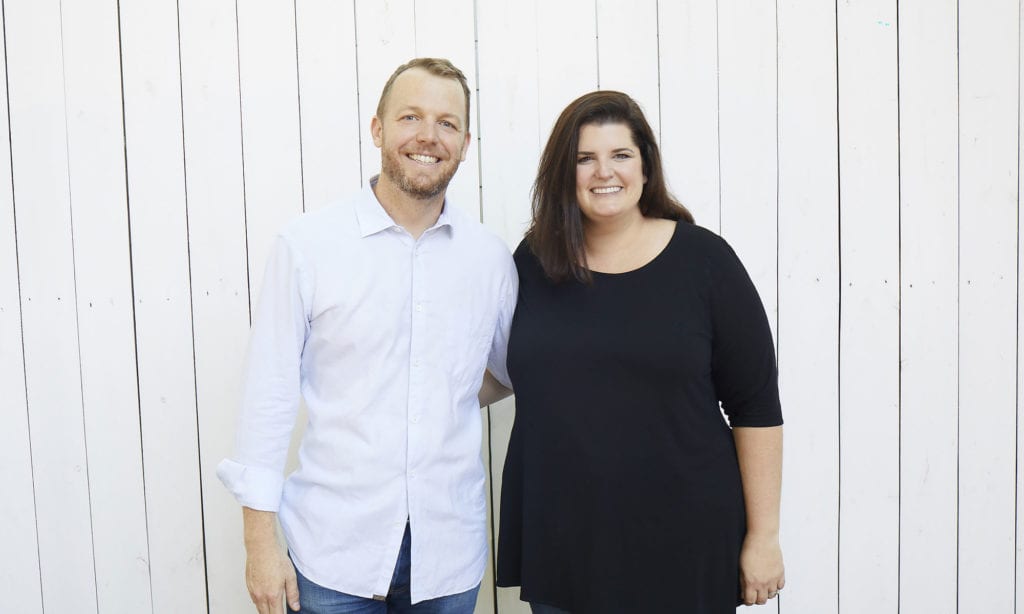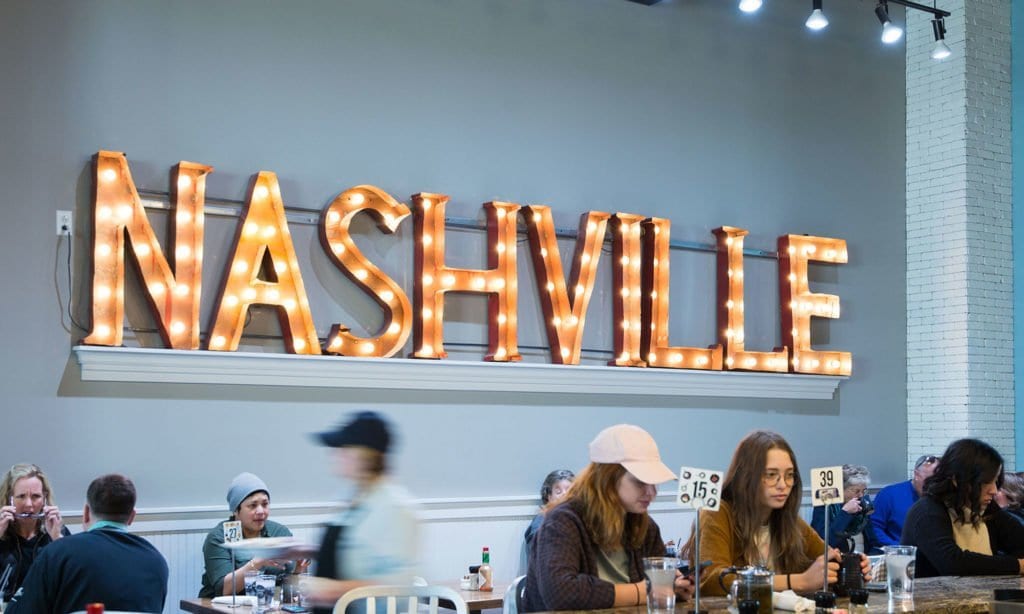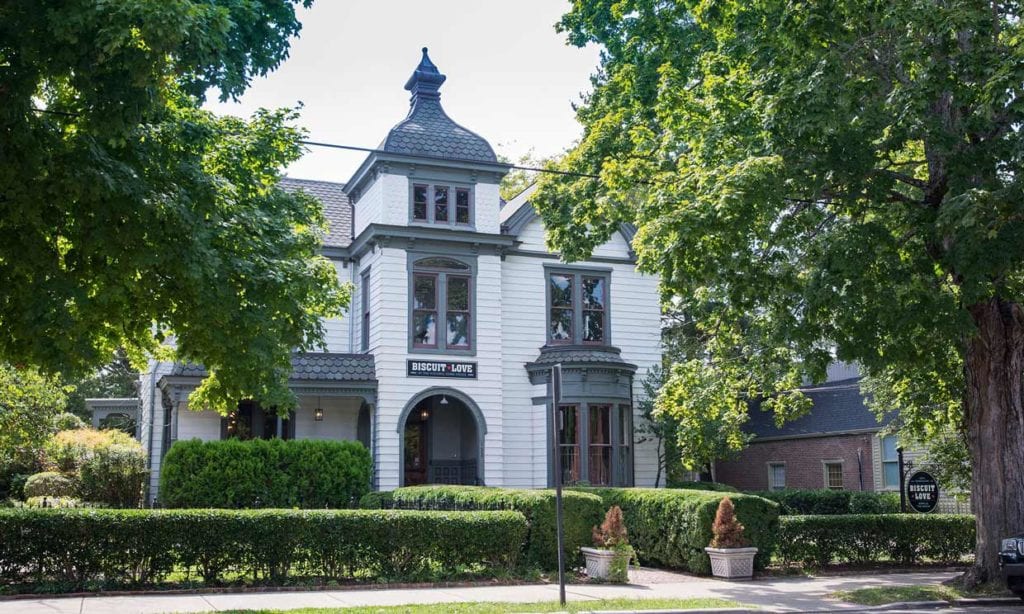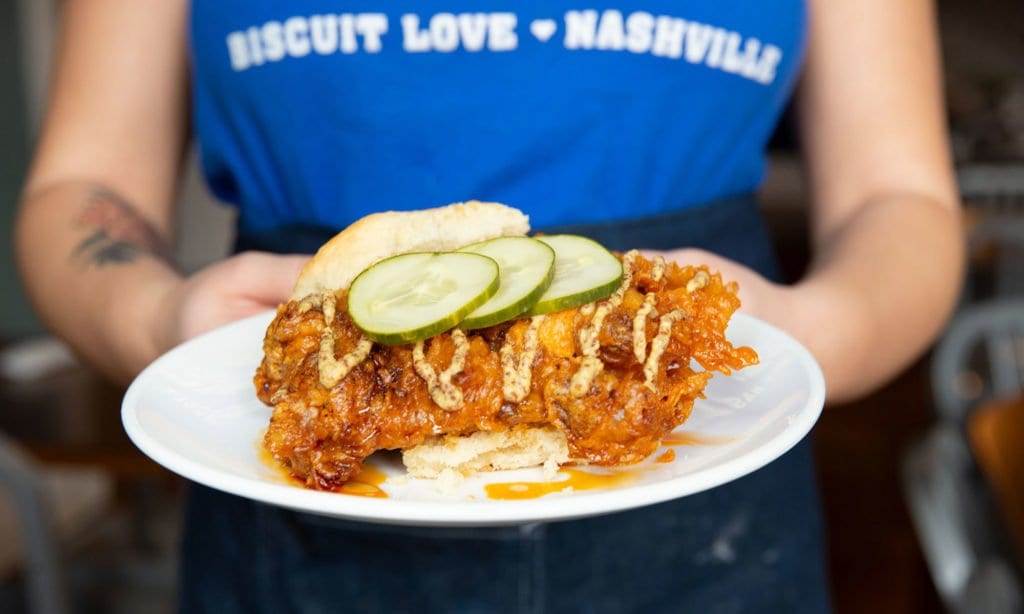In 2012, Karl and Sarah Worley launched Nashville-based Biscuit Love with a food truck. Author Steve Coomes sat down with Karl to discuss the journey from a food truck to a successful restaurant concept. They spoke in mid-2019. Biscuit Love is a valued Winston CVap® customer.
Creating a Concept
[Steve Coomes] What was the idea that gave life and legs to Biscuit Love?
[Karl Worley] “We didn’t know what we wanted to do when we started, honestly. It wasn’t some grand vision we had. Sarah and I knew we wanted to serve food to people, and I’d been to culinary school. That’s about it. We were too poor to have $300,000 to open a restaurant, but we figured we could get $10,000 to start with a food truck. Fortunately, we met with a guy who had a few restaurants already, and who let us borrow a food truck to get started.”
Article at a Glance
[Steve Coomes] That’s incredibly generous. Why did he do that?
[Karl Worley] “I was talking to him about opening a restaurant someday and he couldn’t talk me out of it after 30 minutes. So, he said the best way to move in that direction was to create a business using his food truck as a kind of experiment. Once we’d gained some experience with it, we could use our findings to create a manageable business plan.”
[Steve Coomes] Did you do a lot of research in preparation for the launch?
[Karl Worley] “Not really, but we knew what we wanted to do. I grew up in Bristol, Tennessee, and I knew how to make biscuits. I wanted to do hot chicken before Hattie B’s hit the scene, you know, bring it to affluent areas like Belmont and West Meade where people probably hadn’t had it. But my wife said, ‘no one there would eat that,’ which is kind of sad to think about now. But at least she’s the one who said I should do biscuits. She said, ‘you know how to make them and you can put whatever you want in between them.’ That was her advice. And that’s where we started.”

[Steve Coomes] How did you fund your start-up?
[Karl Worley] “Just us. But we were really blessed that it kind of took off without us really knowing what to expect. We got through year one and year two and made okay money, but we never killed it. Still, it set us up for knowing a lot more about what we wanted to do. It was a really good test of concept.”
[Steve Coomes] How hard was the work getting the concept off the ground?
[Karl Worley] “There were a lot of weeks where we were at it 80 to 100 hours. Summer’s fun when you get to see a profit. But winter’s not so fun when you’re going out knowing you’ll lose $500 you couldn’t afford to lose. It took a lot of time and patience.”
[Steve Coomes] Would you tell other operators to test their concepts with food trucks first?
[Karl Worley] “I’d really point them to food halls, which are the next iteration of food trucks.”
[Steve Coomes] Why food halls?
[Karl Worley] “I love the idea of starting with minimal investment without the worry of weather, bathrooms, traffic, etc. that are challenges with a food truck.”
Transitioning to Brick-and-Mortar
[Steve Coomes] When did Biscuit Love become a brick-and-mortar restaurant concept?
[Karl Worley] “We opened a brick-and-mortar location in 2015 in the Gulch, a neighborhood in Nashville. Back then, it was just coming into its own. It wasn’t hot yet, it hadn’t fully recovered from the Great Recession, so it was affordable for us.”
[Steve Coomes] How did the business do?
[Karl Worley] “We were pretty fortunate. By the end of year one, we were doing 800 covers on weekends and 500 to 600 covers on weekdays.”
[Steve Coomes] What kind of check average is that unit generating?
[Karl Worley] “During the week, it’s $12. On weekends, it’s $15 and usually includes a mimosa.”
[Steve Coomes] What’s traffic look like now?
[Karl Worley] “We’ll see 1,200 to 1,400 people on a Saturday. That restaurant turns 12 times on a Saturday.”
[Steve Coomes] What were the keys to that location becoming so successful?
[Karl Worley] “My wife and I always say God because we couldn’t do the same thing again if we tried. There also was this perfect storm of things that happened: people really gravitated toward it because breakfast was an underserved market, and the media liked it.”
[Steve Coomes] How did you market that restaurant?
[Karl Worley] “We actually didn’t market it much at first. Social media was going already from the food truck, but that was about it. We were so busy running the restaurant that marketing was sort of an afterthought. Didn’t actually market it seriously until we called on a PR firm to handle it for us. And we also needed to stop trying to handle all the media requests, which they did.”

Branching Out
[Steve Coomes] Unit one was a huge success, so how difficult was opening units two and three while maintaining things like food quality?
[Karl Worley] “Going from one to two was challenging, but going from two to three about killed us. From what I’ve heard, it’s easier after the third one, which is what we’re hoping for! What made going from one to two pretty manageable was the fact that we had a really good team in place at unit one. It also helped that those units were just three miles apart.”
[Steve Coomes] How did you solve those problems?
[Karl Worley] “By creating systems and communicating better, which is something I’m horrible at. Luckily, my wife is really good at communication. She and I have also learned to work with each other better by focusing on our own strengths and skill sets.”
[Steve Coomes] Did your menu change at all as you opened additional locations?
[Karl Worley] “We always had three or four standard items on our food truck, and then 15-20 on the menu at the first unit. We’ve been purposeful about that number being the same with every unit. No one does a 50-item menu well. We’d rather do 12 items really great and still diversify it some, so there’s pretty much something for everybody. It might not be the perfect thing for everyone, but everyone’s going to be able to find something.”
[Steve Coomes] When did you begin to see that your business model was finally duplicable?
[Karl Worley] “Honestly, for the last two years, we’ve hit a pause on Biscuit Love’s growth because we know the next growth step is to go out of this market. I want to get as much right with the concept as possible before we do that.”
[Steve Coomes] What type of planning and forecasting does that entail?
[Karl Worley] “It’s come down to thinking about what we really want for our company, and that’s not just a bunch more restaurants.”

“When we opened the first one, people knew it had potential, so they’d ask us, ‘what are your dreams for this?’ ‘We’d say something like, ‘we’re going to open 30 of them, sell it and retire to Paris, France.’ That really was a dream of ours. But we gradually started to see more of what it could become other than just a retirement plan.”
“When we had the food truck, things were easy. Three employees and us. And everyone knew what Biscuit Love was: really good ingredients sourced to make our own great food of the South. It’s simpler when the business is so small.”
“But we opened up our first location, we got more employees, the business became more complex and we saw the mission get watered down. We kind of lost focus on our idea of where we wanted to go with it.”
Seeking Inspiration
[Karl Worley] “So we went to Zingerman’s Deli (in Ann Arbor, Mich.) to meet with its owners (Ari Weinzweig, Paul Saginaw, Frank Carollo, and Maggie Bayless). We sat at their feet for two days envisioning what Biscuit Love looked like in 2025. Sarah and I wrote down our own visions for it separately, and then they had us read them. Neither of our visions for Biscuit Love said we wanted to sell it someday.”
[Steve Coomes] What drew you to the Zingerman’s owners for advice?
[Karl Worley] “I believe you should always have a mentor who shares your philosophies and inspires you. They do all of these things and so much more.”
[Steve Coomes] So, when you return Biscuit Love to growth mode, how does that happen? Franchising? Partnerships?
[Karl Worley] “We want to grow through company-owned stores with people (in those locations) who own 30 percent of the store. We want them to have the ability to make a lot of money, but we still want to own enough of our stores to stay true to our company’s roots. So, what that means is if I tell one of those owners to buy from a specific farm that we’ve approved–even though the food is four times as expensive as what they could buy elsewhere–that still happens. We want to support the people who supply our ingredients as much as we want to support our future partners.”
[Steve Coomes] So it isn’t necessarily your goal to build a large Biscuit Love chain?
[Karl Worley] “We really love what it stands for and what it’s doing, and we’d love to see what it could do going forward. We do have investors and there’s some healthy desire to expand. The truth is money doesn’t motivate me, but we have investors who are motivated by that. Sarah and I will figure out how to do these next steps. What I know is it’s going to be interesting.”

Overcoming Challenges
[Steve Coomes] When you and Sarah spent time envisioning Biscuit Love’s future separately, did you learn you shared a unique goal for the company?
[Karl Worley] “Part of what we both wanted to do was change how the industry has traditionally treated its employees. Keeping great employees is crucial to our ability to grow this company. So you give people a great environment to work in, a safe place to work. You give them a functional family that sticks with them. When you give employees something to believe in, they’ll follow you; they’ll lie down in the road for you.”
[Karl Worley] “We offer healthcare to every full-time employee. We have a full-time English-speaking and part-time Spanish-speaking counselor on staff who help our employees with things like finding affordable housing. Nashville’s hot right now, so it’s an expensive place to live. So many of them don’t know how the healthcare system works, so our counselors teach them about how insurance works and primary care healthcare works. Bank accounts are another thing: not everyone has them. We found a local bank to partner with us to show our employees how to use bank accounts.”
Taking Care of Your People
[Steve Coomes] The search for good labor is an ongoing industry challenge. How has Biscuit Love fared?
[Karl Worley] “Last year our retention rate was 87 percent, which is the opposite of the industry. We don’t get everything right 100 percent of the time, but we get it right quite a bit.”
“What bothers me some is too many people dismissing the younger generation for what they say is a lack of motivation or for moving around to different jobs too often. That age group is about 90 percent of our workforce, and yet we’ve got some employees in that group who I’d put up against any 50-year-old any day of the week.”
[Steve Coomes] Often, as operations grow, you commonly gain efficiencies with scale. Has that happened as you added units?
[Karl Worley] “Somewhat, but not always. When we added our third location, my wife and I couldn’t tag team anymore, which made it difficult. We have a lot of really good people, but just the challenge of, say, making a menu change, rolling it out at three locations to the level of quality you want isn’t easy.”
“But other than the way the food and recipes are executed, I’m really open to ideas being shared between stores. Our Franklin store might call and say they tried doing chicken a certain way on Tuesday when it was slower, and now they want to test doing it that way on Saturday when it’s busier. I’ll say, sure, and go see if it works. And if it does, I let them roll that out to other stores.”
“I really don’t want robots working for me. The day that I think I have the smartest and best way to do everything is the day Biscuit Love goes into the toilet. I’ve got 150 super-smart employees who often come up with the best ideas on their own.”
[Steve Coomes] I gather you see your and Sarah’s roles at this point to lead and guide?
[Karl Worley] “On most things. Starting a restaurant is a lot like having a kid. You can lead and guide it, give it direction and love, but it’s still going to do what it wants to do. You hope you’ve given it enough structure and love and guidance that it can make the right calls. I feel like we’ve done that pretty well with Biscuit Love.”
Follow Biscuit Love

